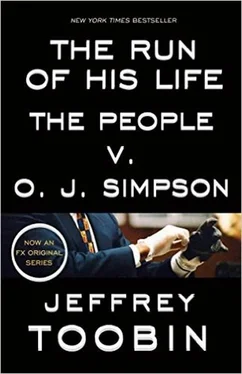All the black jurors denied that race played any role at all in their deliberations or their decision. To me, this is implausible. The perfunctory review of nine months’ worth of evidence; the focus on tangential, if not actually irrelevant, parts of that evidence; the simply incorrect view of other evidence; and the constant focus on racial issues both inside and outside the courtroom-all these factors lead me to conclude that race played a far larger role in the verdict than the jurors conceded. As Carrie Bess indicated in her unguarded words after the verdict, they were protecting their own. This is not especially unusual. For better or worse, American jurors have a long and still-flourishing tradition of both taking race into account in making their decisions and denying that they are doing any such thing. The ten whites, one Asian, and one Latino in Simi Valley who in 1992 acquitted the LAPD officers in the Rodney King case denied that race factored into their decisions; so did the ten black and two white jurors who in 1990 acquitted Washington mayor Marion Barry of all but one of the fourteen narcotics charges against him. In 1955, the two white men charged with murdering Emmett Till were acquitted by an all-white Mississippi jury after about an hour of deliberations. A spokesman for the jurors attributed their decision to “the belief that there had been no identification of the dead body as that of Emmett Till.” Nor is this phenomenon limited to celebrated cases. In the borough of the Bronx in New York City, where juries are more than 80 percent black and Hispanic, black defendants are acquitted in felony cases 47.6 percent of the time, which is about three times the national acquittal rate of 17 percent for defendants of all races. In these cases, among these jurors, race mattered-and so it was with the Simpson jurors, too.
That race continues to count for so much with African-American jurors should come as no great surprise. Racism in law enforcement has persisted through many decades of American life, and black citizens, and thus black jurors, have stored too many insults for too long. The police in general, and the LAPD in particular, reap what they sow. But the genuine grievances that have led to a tradition of black hostility to officialdom have, in turn, fostered a mode of conspiratorial thinking that outstrips reality. An Emory University study of 1,000 black churchgoers in five major cities in 1990 found that more than a third believed that HIV was a form of genocide propagated by white scientists, a theory shared by 40 percent of African-American college students in Washington, D.C. Understanding the roots of these beliefs should not mean endorsing them. To do so is merely patronizing, a condescending pat on the head to those incapable of recognizing reality. Better, rather, to hold everyone to the same standards, and better, likewise, to speak the truth: Whites didn’t concoct HIV-and O.J. Simpson wasn’t innocent.

The backlash against both the jury and Simpson himself was accelerated by Robert Shapiro, who, as was his custom, put his interests ahead of his client’s in the immediate aftermath of the verdict. Shapiro left the courthouse on October 3 and traveled to an ABC studio, where he gave a long-promised interview to Barbara Walters. In their conversation, an obviously bitter and angry Shapiro said of the defense effort in the case, “Not only did we play the race card, we dealt it from the bottom of the deck.” He remarked further that henceforth, he would neither speak to Bailey nor work with Cochran. Shapiro’s remark about the race card was featured prominently in the following day’s news stories about the verdict.
Shapiro’s conduct was shameful on several levels. His disgust about the “race card” was, first, intellectually dishonest, because it was Shapiro himself who had constructed Simpson’s race-based courtroom and media defense in the first place. Second, his statement helped cement the public impression that his client was acquitted because of the jurors’ racial sympathies, not because of his innocence, thus virtually guaranteeing that Simpson would have no chance to reestablish anything like his normal life. In my view, Shapiro’s analysis of the case was more or less correct, but Simpson had a right to expect that his own lawyer would not portray the case, in substance, as the story of a murderer who got away with it. Finally, Shapiro trivialized the work of his colleagues Barry Scheck and Peter Neufeld, who had constructed a serious forensic and nonracial defense in the case.
None of this mattered more to Shapiro than the opportunity to reingratiate himself with the West Los Angeles world that meant everything to him. After the Walters interview, Shapiro called his old friend Larry Feldman, the lawyer who had defended him in Mark Fuhrman’s libel suit. Shapiro boasted that he had just told Walters that the defense team had played the race card from the bottom of the deck. “You’re kidding,” an appalled Feldman told him. “No, really,” said Shapiro, who then broke into self-satisfied laughter.
Notwithstanding the fame and, in some instances, fortune that the case brought them, most of the major participants now regard their experience with considerable bitterness. The most bizarre postscript to the case concerns F. Lee Bailey. In 1994, Shapiro and Bailey shared another client besides O.J. Simpson: Claude Duboc, one of the biggest marijuana dealers in the world. As part of a plea bargain in northern Florida, arranged the month before the murders on Bundy Drive, Duboc agreed to turn over virtually all of his assets to the United States government. Among them were shares in a Canadian company called BioChem Pharma, worth about $6 million at the time of the plea bargain. Also at that time, Duboc believed those shares were likely to appreciate greatly in value, so the prosecutors agreed that Bailey would hold on to the stock for the months until Duboc was formally sentenced.
Two years later, after the verdict in the Simpson case, the value of Duboc’s stock had risen by more than $20 million, and Bailey told the prosecutors in Florida that he believed the appreciated portion of the stock assets belonged to him, not the federal government. The deal was never put in writing, so the judge held a hearing in February 1996 to determine the terms of the stock arrangements. The lead witness for the government was Robert Shapiro. He testified that he understood the agreement to hold that the United States, not Bailey, was entitled to the appreciated portion of the stock assets. When Bailey did not produce the stock certificates or the equivalent in cash, the judge threw the sixty-two-year-old lawyer in jail.
Bailey served forty-four days in the federal detention center in Tallahassee. He was released on April 19, only after pledging virtually all of his assets in collateral. However, after a month of living with this nearly impossible financial bind, Bailey gave up his claim to the stock. This financial imbroglio, of course, only intensified the enmity between Shapiro and Bailey. Bailey rages with little prompting at what he regards as Shapiro’s betrayal. The cooler Shapiro merely notes that he plans never again to speak with Bailey. He has told friends with a smile, however, that he paid his own way to Florida to testify against Bailey.
Barry Scheck and Peter Neufeld returned to New York after the Simpson trial. They found that their celebrity from the case had not translated into financial support for their Innocence Project, which uses DNA testing to free wrongfully convicted prisoners. When they mentioned to Shapiro the possibility of a Los Angeles fund-raiser for the project, he told them glumly, and probably accurately, “No Jew will give you a dime in this town.” The two New Yorkers have also developed the informal specialty of vetting the books on the case written by members of Simpson’s defense team. In early 1996, they reacted with shock to a draft of Shapiro’s volume, The Search for Justice , for it repeatedly violated the attorney-client privilege by quoting conversations with Simpson without his consent. When they passed along their concerns to the author, Shapiro didn’t change the substance of the book-but he did add Scheck and Neufeld to the list of former colleagues with whom he no longer speaks.
Читать дальше













